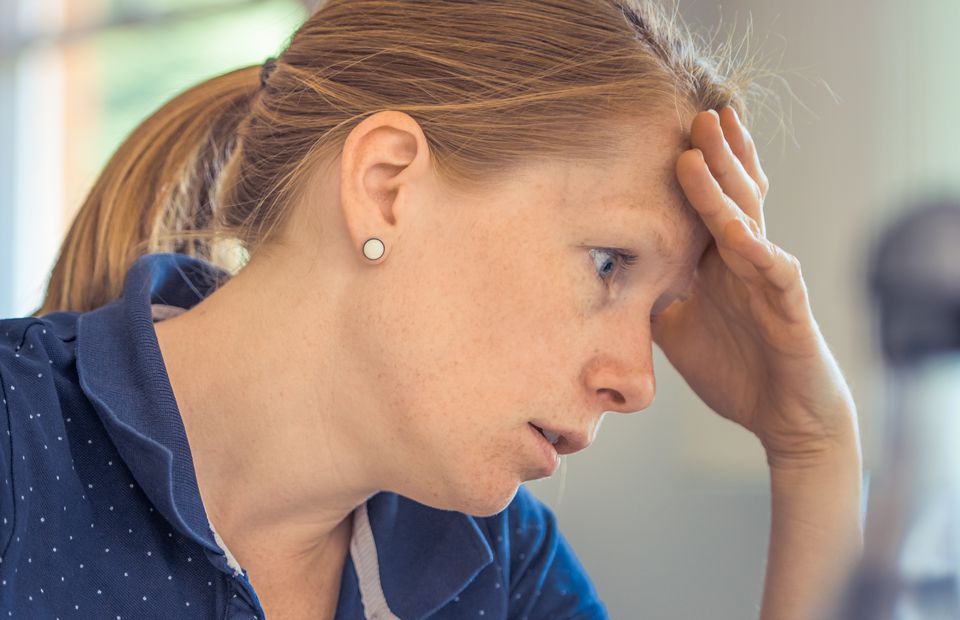No secret here: We’re seriously stressed, and it’s making us sick.
If you’ve ever woken up with a sore throat and thought, “Why am I the one who
always catches the office cold?” or pushed through several sleepless nights thinking about a work deadline, this probably won’t surprise you: 67 percent of people say that their job stresses them out, and 33 percent think that stress hurts their physical health, according to an APA study on
stress in America.
Add to that stress of looming deadlines, juggling work with childcare, managing an imbalance between work life and personal life, and a wholly uncertain road forward—well, the stress compounds.
If you’ve ever binged on Ben and Jerry’s or blown off your workout after a bad day at work, you know that we don’t make our healthiest decisions
when we’re worried.
You might even think of that cycle as your normal, figuring that a bad week always balances out. But stress takes a more subtle—and serious—toll on our bodies than most of us realize. It doesn't just lead to unhealthy decisions—it actually affects us physically.
Bad Work Is Bad For You: It's Science
See, our bodies depend on hormones for our metabolism, digestion, reproduction, and other systems to work properly.
Chronic stress (e.g. those repeated long days or confrontations with your boss at work) can make those hormones go haywire, which wreaks havoc on basically everything.
Here's How It Works
Your body and your hormones are designed to protect you from danger. Let’s say a car suddenly swerves into your lane on your commute to work. Your body kicks into overdrive, releasing two hormones that help you face the imminent danger: adrenaline and cortisol.
Adrenaline increases your heart rate and blood pressure, while cortisol increases your blood sugar and slows down your immune, reproductive, and digestive systems to redirect your energy to the danger at hand.
That resulting “adrenaline boost” is what triggers you to slam the brakes when that car cuts you off. In the short term, that system—A.K.A. “fight or flight”—works exceptionally well.
Once the danger is over, your body starts to settle down. Your adrenaline and cortisol drop, your heart rate decreases, and all your body’s systems start to function normally again. But ever notice that you feel totally exhausted for a few seconds, or even minutes, afterward?
You’d never want to live in that “fight or flight” state 24/7. It drains your energy stores and wears you out. The trouble is that your body treats all stress, whether triggered by a looming car accident or just your boss piling another project on your desk, the same way.
When it’s temporary, it’s like swerving away from that car. Your hormones rise. Your body recovers. You move on. No big deal. But if you’re constantly pulling 14-hour days and answering emails all night, your body never gets a chance to recover. Your adrenaline and cortisol stay sky-high all the time, causing many seemingly unrelated physical signs of stress.
6 Signs Your Work Is Taking A Physical Toll
You Unexpectedly Gain Weight
Despite nailing your nutrition and exercise, you’re feeling puffy. Blame that on the cortisol.
In stressful situations, the hormone stores more fat in our abdomens
to preserve energy. Sounds helpful, except that it causes stubborn weight gain in the face, upper body, and torso. Because
that’s not stressful at all.
Though that fat storage can occur regardless of your eating habits, stress also makes you crave carbs and sugar. So that feeling that you need that stale donut after a meeting goes badly? It’s not just you.
After being exposed to several stressors in a lab, women in one
study produced more cortisol and ate more high-sugar and high-fat foods.
You're Skin is Breaking Out All The Time
Stress-induced cortisol spikes also prompt the skin to
produce more oil, which gets clogged in your pores and creates acne. It also worsens pre-existing skin conditions like
eczema.
You're Getting Injuries, Aches, And Pains More Often
From feeling shooting pains deep in your bones to creaking all over the place, your body feels like it’s feeling apart. Extreme stress
stops our bone-building cells from fully forming, setting us up for skeletal injuries and eventually, osteoporosis.
Your Sleep Is Totally Off-Schedule
You’ve been itching for a nap since you woke up….but you get a second wind the moment you hit the sheets. What gives?
Unfortunately, stress sends those hormones rising and falling at random times. Those badly timed hormone boosts are what keep you tossing and turning, or waking up, in the middle of the night.
You're Feeling Gassy or Nauseous
Seconds before delivering your big pitch, your stomach starts rumbling....and...you make *that noise* in front of everyone.
Though it seems like the world’s just conspiring against you, indigestion is another natural (if cruel) sign of uncontrolled stress.
High cortisol shuts down our digestive systems, which makes us
digest food more slowly, causes bacterial growth in our guts, and even breaks down the lining of our intestines. These contribute to gassiness and other super annoying stomach issues.
You Catch Bugs At Inconvenient Times
During your busiest time of the year, you catch a cold because
of course you did. Elevated cortisol
suppresses your immune system, which is probably the most dangerous health consequence of all.
Constant stress forces our bodies to dedicate every single resource to surviving the day by whatever means possible. And when they’re already really strained, our bodies are less prepared to cope with any serious illnesses that might arise.
Seem overdramatic? Think of your overstressed body as a short-staffed restaurant. On a slow day, it manages well enough. But when a party of 20 sits down during the Sunday brunch rush? Everything goes to hell. Same goes with your health.
As you become older, and more likely to get heart disease, Alzheimer’s, cancer, and obesity-related diseases, you’ll want to have every physical advantage that you can. Sounds scary, but there’s a solution.
By reducing your stress, you can restore your normal hormone balance and reverse many of these symptoms.
So Now What?
But if you knew how to
manage your stress, you wouldn’t be having these health problems in the first place. So what are you supposed to do?
Start with small
acts of self-care. Health benefits aside, it’s a form of stress relief that remains totally within your control. Try a new tweak each week and watch the benefits build up over time.
De-stress Your Diet
Don't worry, no need for a juice cleanse or any fad diets. Combat your colds and bugs with foods and herbs that are proven to improve your
immune function.
Incorporating them into your diet is as simple as putting together a big salad: you’ll get the benefits of spinach, broccoli, and sunflower seeds in one bowl.
Throw some ginger into your smoothies or teas, swap out coffee for green tea (or at least alternate between the two), or add some almond butter to literally everything.
Pump Some Iron
Weight training is the best way to
rebuild your bone density and slow down the bone weakening that comes with age. To get started, try a few of the most effective exercises: squats, lunges, and
step-ups.
Pick weights that give you that satisfying burn without hurting your form. Crunched for time? Check out the classes that combine cardio and strength like
Peloton or do one of these
DIY circuits in your living room.
Squeezing in another workout can be difficult when you’re already stressed. But if its bone-boosting benefits haven’t convinced you, take this chance to release your aggression on your barbells instead of, say, your boss’ face.
Get Your Gut Health Under Control
Just adding Greek yogurt (the kind with “active cultures” of bacteria, not artificial preservatives) to your breakfast can go a long way toward restoring that balance, which will get things moving in your digestive system. If you can’t stomach Greek yogurt, take a probiotic supplement instead.
They can be costly, but if you’ve ever wasted a full day worrying about your bloating or making bathroom trips every 20 minutes, you’ll know that a strong stomach is priceless.
Put the Blue Light Away! Stop Checking Emails Before Bed
Confession: I’m the worst offender here. Right before bed, I try to “finish up a few things" to lighten tomorrow's load.
I get wrapped up in a mentally consuming task, and then I act super surprised when I’m tossing and turning all night as a result. You might be worried about missing a potentially time-sensitive message, but if you feel absolutely dead the next day, you’ll undo all of the progress you might have made at midnight. Which, you know, doesn’t do much for your stress.
Even if you have to sacrifice some work
time for self-care, your renewed focus and energy will help you manage stress better once you’re back at your desk. More importantly, you’re taking back control of your long-term mental and physical health. After all, you can always leave an unhealthy work environment, but you can never escape an unhealthy body.












